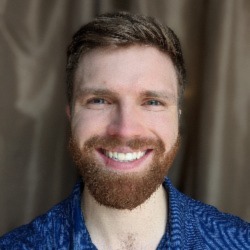Closed-loop Spectroscopy Lab: Light-mixing Demo Kit (Round 2)
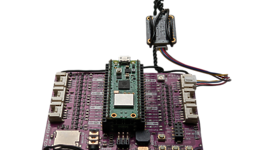
.png)
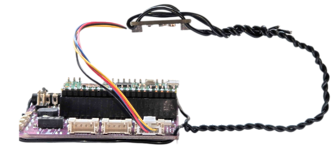
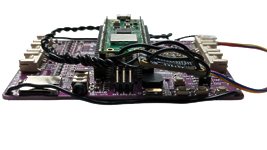
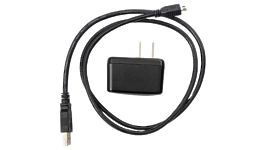
Product Details
Manufacturer Part #
US002133-1.0
Product Description
Overview
We need new materials faster than ever to solve global challenges such as climate change, plastics pollution, and cancer. Autonomous research laboratories, also called "self-driving" laboratories, can accelerate the time-to-market from 20 years and $100 million to as little as 1 year and $1 million. However, the barrier to entry for researchers is high in terms of both capital and multi-disciplinary expertise required (hardware, robotics, electronics, artificial intelligence, simulations). Several excellent low-cost platforms and demos help reduce barrier-to-entry; however, we need something cheaper and easier to set up for broader adoption. We propose Closed-loop Spectroscopy Lab (CLSLab): a "Hello, World!" for teaching and prototyping autonomous research laboratories using a Raspberry Pi Pico W microcontroller, an RGB LED, a light sensor, and optimization algorithms. Here's a visual summary of the project:
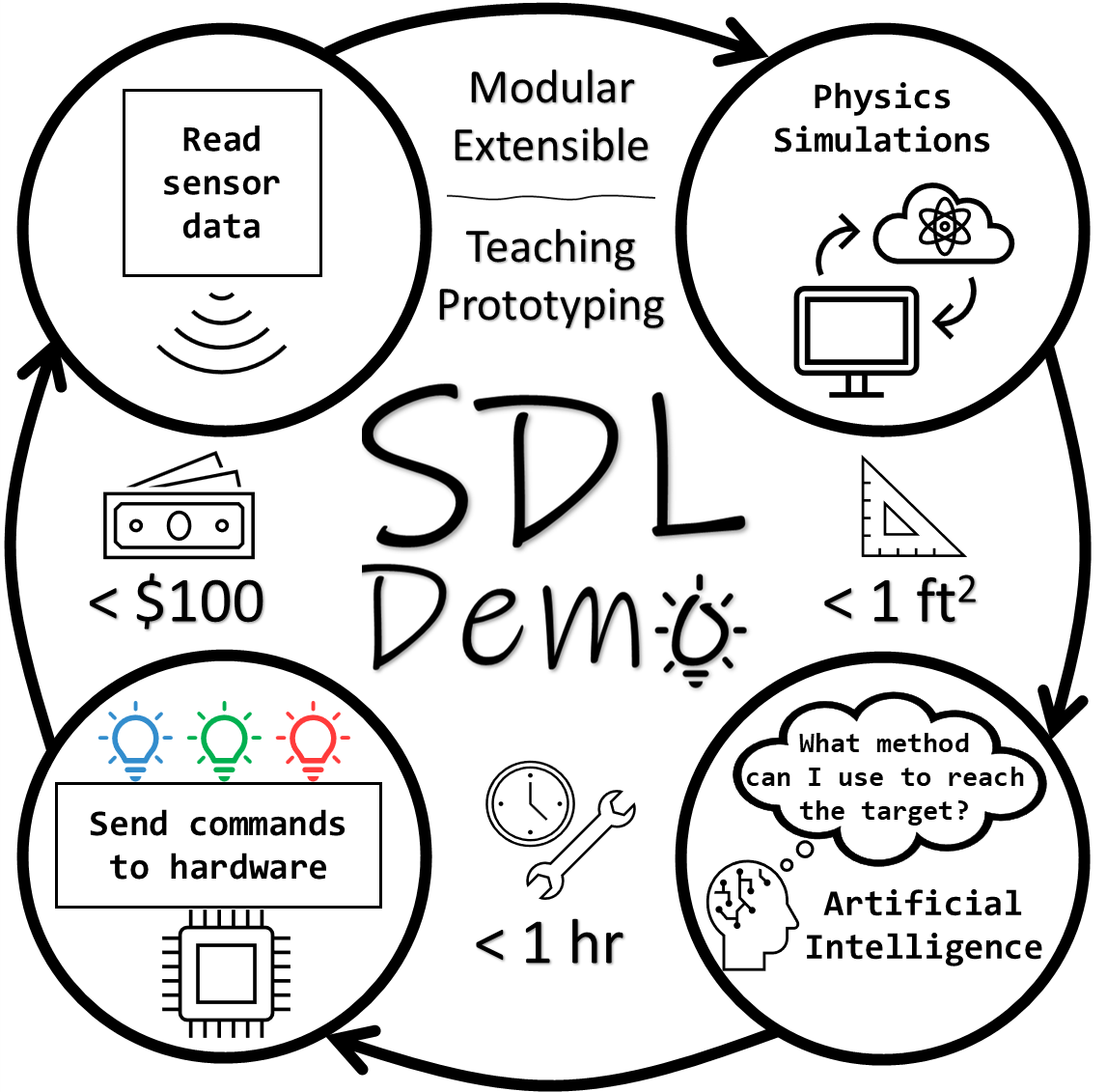
The three most important things you should know about this project are:
- Closed-loop Spectroscopy Lab is a "Hello, World!" for autonomous scientific experimentation and discovery
- This project teaches principles from electronics, optimization, automation, the internet-of-things, and scientific discovery
- The open-source demo can be used for prototyping more complex systems in a low-cost, low-risk setting
This kit is for STEM professors, students, researchers, hobbyists, and citizen scientists. Here are some potential use cases:
- Professors will have access to a low-cost, low footprint, and low setup-time demo for training the next generation of students interested in autonomous scientific discovery.
- CLSLab can be used to teach autonomous research principles of hardware/software modularity, reconfigurability, and advanced optimization algorithms.
- Newcomers to the field will get "a foot in the door" that can be used as a stepping stone to more complex, impactful systems, more funding, and more opportunities.
- The demo is open-source, modular, and extensible, so users will have a low-cost system for prototyping new hardware and software in a low-risk setting.
Backstory
I'm passionate about research, materials science, automation, efficiency, and data science. Many of these passions grew together and became apparent during my undergraduate degree in applied physics at Brigham Young University. I carried out labor-intensive experiments growing structurally modified carbon nanotubes for battery applications. With many processing steps and transfers of delicate samples, the yield rate was often low when a carbon nanotube electrode made it into a battery cell. Like many researchers, I often thought about the underlying mechanisms of the experimental results, how I could perform experiments more efficiently, and how I should choose the next set of parameters to run.
While transitioning to a master's program in mechanical engineering, also at Brigham Young University, I became more proficient in coding and hardware design. In the process of trying to understand better how and why hydrogen causes metals to become brittle (tens of millions of dollars to repair when building or bridge parts fail), I designed and built a semi-automatic induction furnace system capable of reaching half the temperature of the surface of the sun in an ultra-high purity environment at less than a tenth of the cost of industrial systems. I also designed a chemically resistant, 3D-printed electrochemical cell that would test the rate at which hydrogen moves through heat-treated metal samples for about a hundredth the cost of commercial kits despite having more features. I often wondered how to increase throughput, parallelize operations, and minimize user time, hardware cost, and setup time. These experiences led to new skills and helped me conduct future experiments more efficiently. When my project took a heavier computational focus, I used basic machine-learning models to predict the properties of new materials. This provided an introduction to data science best practices and a brief exposure to efficient optimization algorithms.
The stage was set for my Ph.D. in Materials Science & Engineering at the University of Utah under the tutelage of Dr. Taylor Sparks (UoU Professor and Materialism Podcast co-host), where I apply state-of-the-art machine learning algorithms to discover novel, high-performing materials for energy applications. Early on, I became aware of efforts to combine robotics, scientific hardware, and machine learning to accelerate the discovery of new materials through autonomous experimentation, now referred to as "self-driving laboratories" and "materials acceleration platforms." I committed to getting my foot in the door; however, I lacked the capital, network, and other resources to create our own "self-driving" laboratory for our experiments. Around this time, I came across a call for brief idea proposals sponsored by the Acceleration Consortium, a community dedicated to revolutionizing materials and molecular discovery to solve societal issues. A key topic in the call for ideas was the democratization of autonomous scientific discovery: reducing the barrier to entry for students and researchers alike to gain exposure and contribute to the field. This captured my attention and led to my designing a "minimal working example" for a self-driving laboratory. I decided to design a system that would cost less than 100 USD, take up less than a square foot of desk space, and require less than an hour of user setup time from the shopping cart to the first "autonomous drive" while retaining fundamental principles of real-world self-driving labs. I realized that systems involving physical matter would likely violate the cost or setup time constraint, so I decided to base it on the "Hello, World!" of electronics - namely, flashing an LED. I received regular feedback from the self-driving lab community via Twitter threads and began prototyping and documenting hardware and software on Hackaday and GitHub, respectively.
Later, I was informed that my idea was sponsored to be presented at the Acceleration Conference in Toronto, CA. While there, I presented preliminary results, connected with individuals from the community, exchanged ideas, and struck up new collaborations. It was a great experience. Since then, the Closed-loop Spectroscopy Lab has evolved to be a mixture of "Hello, World!"s from multiple topics, including electronics, optimization, physics-based simulations, and internet-of-things communication. Recently, the project placed as one of ten finalists in Hackaday's 2022 "Save the World Wildcard" competition. The project ecosystem is quickly expanding:
- support and attention from several leaders in the field of self-driving laboratories [1, 2]
- product design feedback loop involving STEM-minded individuals in high school and higher education
- exposed one device as an open-source test platform that can be controlled remotely by anyone, anywhere in the world (see Colab notebook)
- a roadmap for demo extensions to chemistry and materials science tasks
- a suite of tutorial notebooks to teach fundamental principles of self-driving labs
- an certified open-source project via OSHWA (project ID: US002133)
Vision
We aim for every student, educator, and researcher interested in chemistry and materials science to have at least one hands-on exposure to autonomous scientific discovery. As you implement this demonstration for prototyping and teaching the principles of self-driving laboratories at a minimal cost, we will get closer to the critical MASS necessary for accelerating impactful materials discovery.
Product Details
- Pico W microcontroller comes with soldered headers and is pre-installed with MicroPython and open-source CLSLab source files
- Less than 1 hour setup time from unboxing to first use, no soldering required
- Can be controlled remotely by anyone, from anywhere, using an ID unique to each Pico W as a passkey (see
- Colab notebook for a publicly accessible test demo located in Salt Lake City, Utah)
- AS7341 light sensor with flexible mounting wire for flexible control of the position and orientation of the sensor
- Client-side API via open-source Python package, self-driving-lab-demo, hosted on PyPI
- A suite of companion tutorial Jupyter notebooks covering topics of cloud-accessible hardware, basic optimization algorithms, advanced optimization topics, database backends, experiment orchestration software, and the use of benchmarking platforms with plans for future topics and notebooks
- Maker Pi Pico base
- Buzzer with switch for optional audio notification of experiments being performed
- Micro SD card slot logging device-side backups of experimental data [Tutorial]
- Extra Grove ports for additional sensors and peripherals
- Breakout female headers for the Pico W
- 128 MB (min.) Micro SD card (compare with Adafruit 5250, pre-inserted into Maker Pi Pico base)
- Database backend
- Stemma-QT to grove connector cable for connecting the AS7341 light sensor to the Maker Pi Pico base
- USB-A to micro-USB-B cable for connecting to a computer for initial setup
- 5V switching power supply with USB port for using the device standalone (after initial setup)
- Only compatible with 2.4 GHz networks - no 5G support on Pico W (context)
- WPA Enterprise (e.g. Eduroam) and other captive portal networks are not supported, but mobile hotspots (may require compatibility mode) or other standalone hotspots can act as alternatives
- Component testing before shipment
- Ensure communication between Pico W and AS7341 sensor
- Ensure data logging capabilities to Micro SD card
- CLSLab source files are hosted on GitHub with public issue tracker and discussions
Product Links
Videos
"From Scratch" Build Instructions
Purchase Information
Unit Deliverable
One unassembled CLSLab: light-mixing demo kit (RPi Pico W with pre-soldered headers, Maker Pi Pico base, AS7341 light sensor, Stemma-QT to Grove cable, USB-A to micro-USB-B cable, 5V/5W wall plug, 6' loose mounting wire, 128 MB (min.) Micro SD Card)
Unit Price
$75.00
Availability
Campaign Funded, ends when minimum unit count reached
Lead Time
20 Days after campaign end date
Options and Add-Ons

Pre-assembled hardware
$5.00
If this option is selected, the AS7341 sensor will come pre-mounted to the Maker Pi Pico base via the mounting wire, and it will ship with the mounting neck folded against the Maker Pi Pico base for compactness (see image).
Sponsors
Sponsor the great works of our community of developers and conservation technologists who are trying to make a real difference. Contact us at sponsor@groupgets.com for more information about becoming a campaign sponsor. For help or any other questions, please submit a support ticket here.
Help
Do you have questions before you back this campaign? We would love to answer them for you! You can either Contact Us or join in on the discussion.
Approved
We are proud to support Closed-loop Spectroscopy Lab: Light-mixing Demo Kit (Round 2) in reaching its goal.
Trusted
GroupGets is a trusted platform, enabling companies and makers to effortlessly sell their products and making technology accessible to all.
Featured Campaigns

HydroMoth (Round 3)
Funded
GroupGet
Funded
177%
Target
100
Price
$135.00
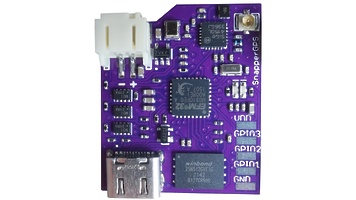
SnapperGPS
Pre-Launch
GroupGet
Funded
TBA
Target
TBA
Price
TBA
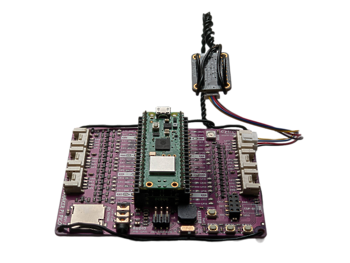
Closed-loop Spectroscopy Lab: Light-mixing Demo Kit
Funded
GroupGet
Funded
1900%
Target
1
Price
$75.00


.png)



